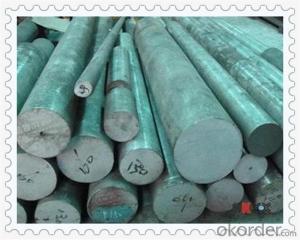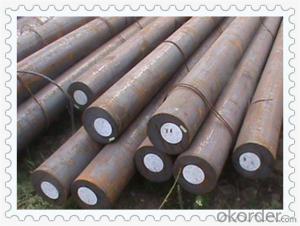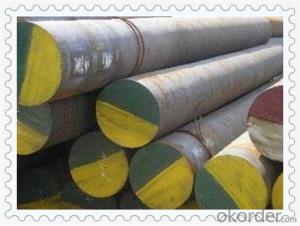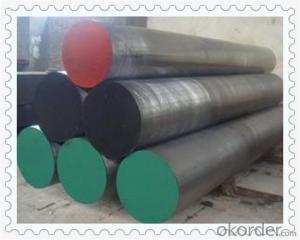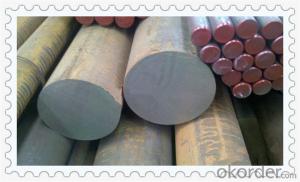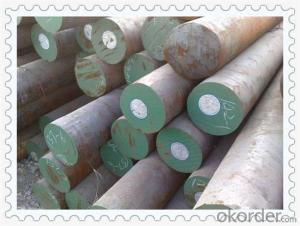Spring Steel Round Bar SUP7 SUP9 SUP10 SUP11 5160H 6150H
- Loading Port:
- China main port
- Payment Terms:
- TT OR LC
- Min Order Qty:
- 30 m.t.
- Supply Capability:
- 10000 m.t./month
OKorder Service Pledge
OKorder Financial Service
You Might Also Like
Spring Steel Round Bar SUP7 SUP9 SUP10 SUP11 5160H 6150H
Products Details
Hot rolled spring steel round bar
Dia: 12mm-300mm
Grade: SUP9 SUP10 SUP11
Quality: ELF+hot rolled
Hot rolled spring steel round bar
Grade | C | Si | Mn | S | P | Cr | B |
55Si7 | 0.42-0.60 | 1.50-2.00 | 0.60-0.90 | Max 0.030 | Max 0.030 | 0.0008-0.0030 | |
60Si7 | 0.57-0.64 | 1.50-2.00 | 0.60-0.90 | Max 0.030 | Max 0.030 | 0.0008-0.0030 | |
60SiCr7 | 0.56-0.64 | 1.60-2.00 | 0.70-1.00 | Max 0.025 | Max 0.025 | 0.20-0.40 | |
55Cr3 | 0.52-0.59 | Max 0.40 | 0.70-1.00 | Max 0.025 | Max 0.025 | 0.70-1.00 |
We can supply you the spring steel (GB standard)
65#, 70#, 85#, 65Mn, 55SiMnVB, 60Si2Mn, 60Si2MnA, 60Si2CrA, 60Si2CrVA, 55SiCrA, 55CrMnA, 60CrMnA, 50CrVA, 60CrMnBA, 30W4Cr2VA
Grade: 55Cr3, 51CrV4, 60Si2Mn4 etc.
DIMENSION
Rounds: Hot rolled dia.11-90mm, Cold drawn dia.5-50mm
Flats: 6-32mm * 44.5-150mm
Delivery condition: EAF+LF+VD, Hot rolled / Cold drawn, Black / Peeled
Application: Auto manufacture, spring wire
With the short stress production line that can finish foundry and rolling in one process, we are able to produce
dozens type of spring flat steel from 6*40mm to 20*150mm.
Products Show
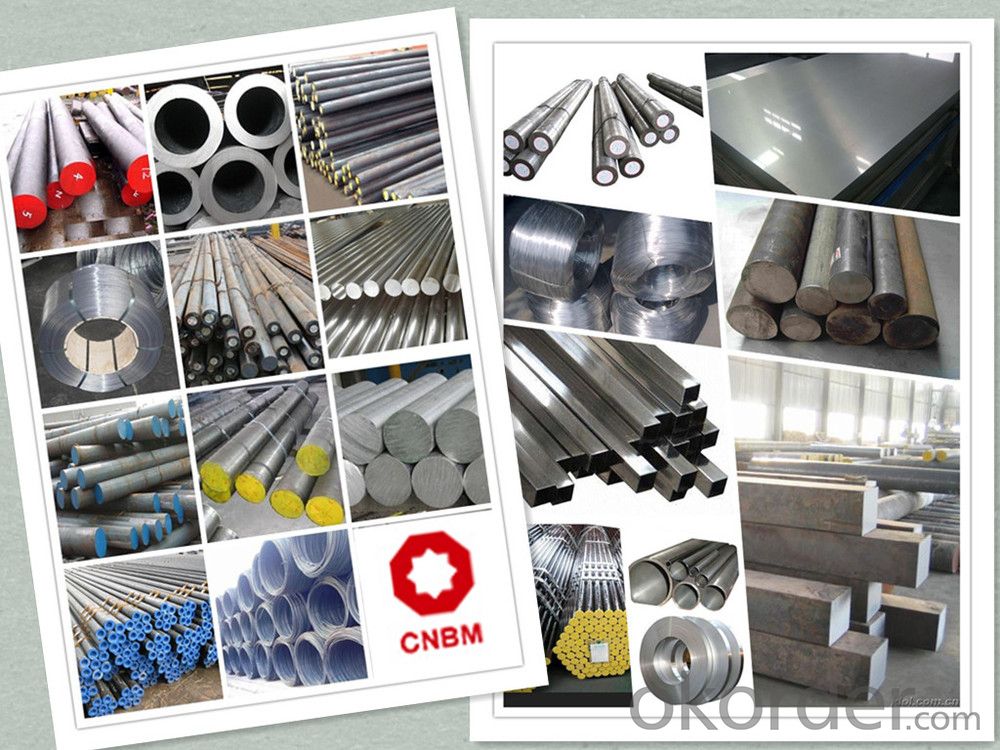
Product Overviews
| Product Name | Typical Grades | Diameter(mm) | Standard adopted |
| Carbon Steel | 20 (1020/S20C/C22) | Ø16-Ø300 |
GB/SAE/JIS/DIN
|
| 40 (1040/S40C/C40) | |||
| 45 (1045/S45C/C45) | |||
| Bearing Steel | GCr9 (51100/SUJ1) | Ø12-Ø250 | |
| GCr15 (52100/SUJ2/100Gr6) | |||
| GCr9SiMn (A485-Gr.1/SUJ3) | |||
Cr-Mo Steel | 20Cr (5120/SCr420H/20Cr4) | Ø12-Ø250 | |
| 40Cr (5140/SCr440/41Cr4) | |||
| 42CrMo(4140/SCM440/42CrMo4) | |||
| Gear Steel | 20CrNiMo | Ø16-Ø600 | |
| 20CrMn(5115/SMnC420/20MnCr5) | |||
| 20CrNiMo(8620/SNCM220/20CrMiMo2) |
Application
| Carbon Steel | Mold bottom, Plastic mold, Construction machinery parts Automobile parts, Security grills, Screens, Construction |
| Bearing Steel | Aerospace, Navigation, Nuclear energy, Chemical industry Electronic information, Petrochemical, Instrument and meter Transportation |
| Cr-Mo Steel | Mechanism & Fasteners gear, Stressed components for vehicles Engines and machines, Parts of larger cross-section |
| Gear Steel | All kinds of gears, Statically and dynamically stressed component for vehicles Engines and machine, Larger cross-section parts, Crankshafts |
Work Shop
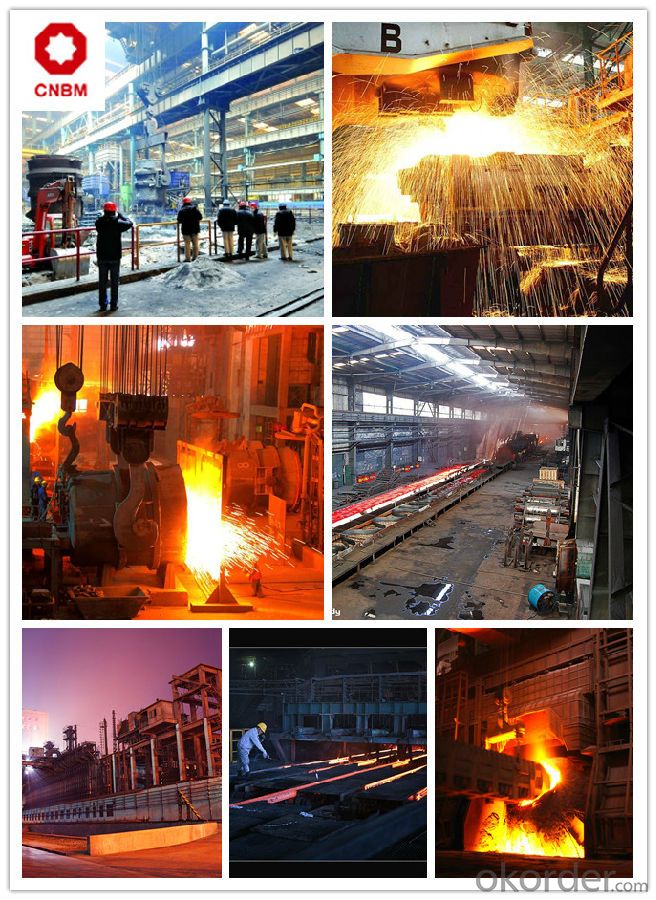
Company Information
CNBM International Corporation is the most important trading platform of CNBM group.
Whith its advantages, CNBM International are mainly concentrate on Cement, Glass, Iron and Steel, Ceramics industries and devotes herself for supplying high qulity series of refractories as well as technical consultancies and logistics solutions.

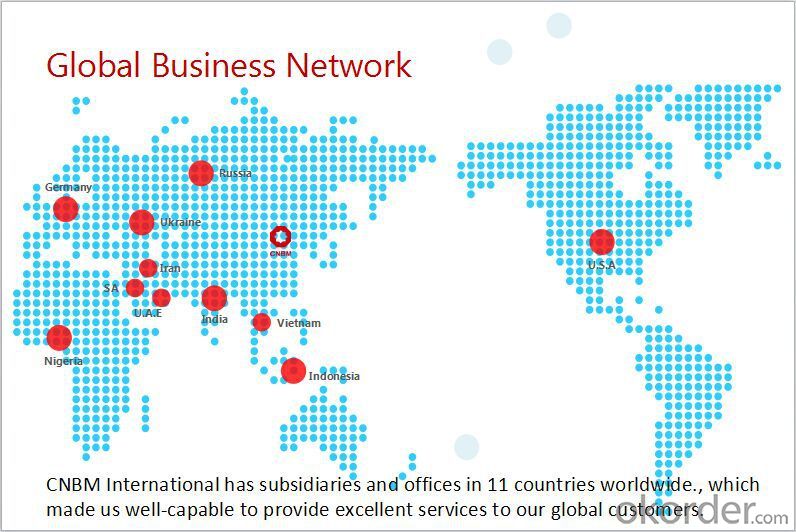
FAQ
1, Your advantages?
professional products inquiry, products knowledge train (for agents), smooth goods delivery, excellent customer solution proposale
2, Test & Certificate?
SGS test is available, customer inspection before shipping is welcome, third party inspection is no problem
3, Factory or Trading Company?
CNBM is a trading company but we have so many protocol factories and CNBM works as a trading department of these factories. Also CNBM is the holding company of many factories.
4, Payment Terms?
30% TT as deposit and 70% before delivery.
Irrevocable L/C at sight.
5, Trading Terms?
EXW, FOB, CIF, FFR, CNF
6, After-sale Service?
CNBM provides the services and support you need for every step of our cooperation. We're the business partner you can trust.
For any problem, please kindly contact us at any your convenient time.
We'll reply you in our first priority within 24 hours.
Packaging & Delivery
1, Packaging: seaworthy package or as required
2, Delivery: 35-45 days or based on quantity
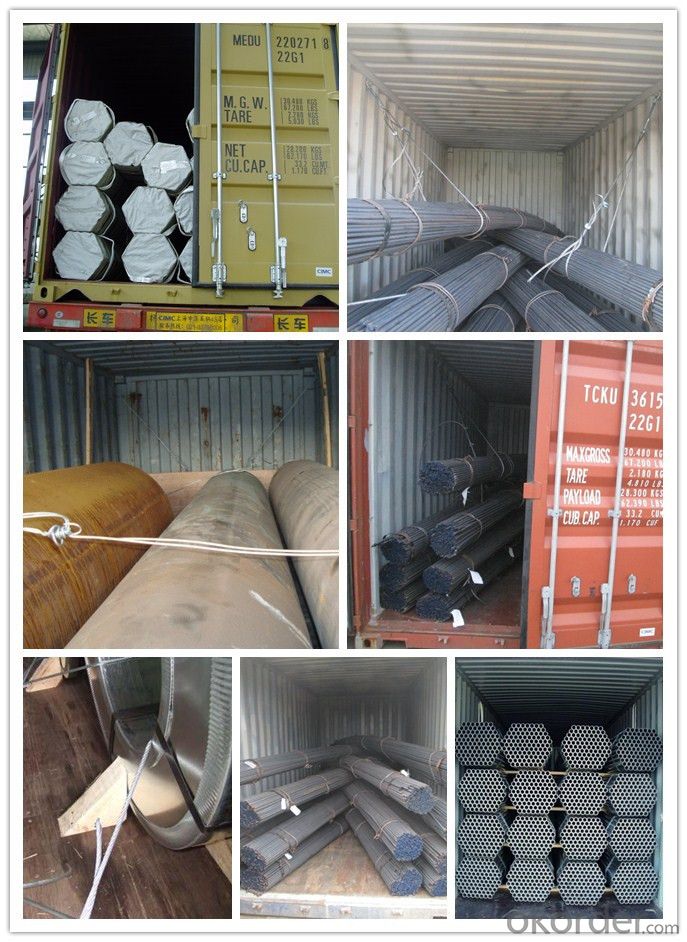
- Q:What are the different types of steel round bars used in the automotive braking systems?
- There are several different types of steel round bars that are commonly used in automotive braking systems. These types of steel are specifically chosen for their strength, durability, and ability to withstand the high temperatures and pressures that are generated during braking. One commonly used type of steel round bar is carbon steel. This type of steel is known for its high strength and excellent hardness. Carbon steel round bars are often used in the manufacturing of brake rotors and brake drums. They are able to withstand the friction and heat generated during braking, ensuring reliable performance and longevity. Another type of steel round bar used in automotive braking systems is stainless steel. Stainless steel is highly resistant to corrosion and rust, making it ideal for brake lines and fittings. It also has good heat resistance properties, allowing it to withstand the thermal stresses generated during braking. Some automotive braking systems also utilize alloy steel round bars. Alloy steel is a combination of different metals, such as chromium, nickel, and molybdenum, which enhance its mechanical properties. Alloy steel round bars are known for their high tensile strength and toughness, making them suitable for applications that require a high level of performance and durability. In addition to these commonly used types of steel round bars, there are also specialized types that are designed for specific applications within automotive braking systems. For example, heat-treated steel round bars are used in the manufacturing of brake calipers and pistons, as they can withstand the extreme temperatures generated by the friction between the brake pads and rotors. Overall, the choice of steel round bar in automotive braking systems depends on the specific requirements of the application, such as strength, durability, heat resistance, and corrosion resistance. By selecting the appropriate type of steel, automotive manufacturers can ensure the safety and reliability of their braking systems.
- Q:What are the different mechanical properties of steel round bars?
- The different mechanical properties of steel round bars include tensile strength, yield strength, elongation, hardness, and impact resistance. Tensile strength refers to the maximum amount of stress a material can withstand before breaking. Yield strength is the stress at which a material begins to deform permanently. Elongation measures the amount of deformation a material can undergo before breaking. Hardness determines the material's resistance to indentation or scratching. Impact resistance is the ability of a material to absorb energy during sudden impacts without breaking.
- Q:Can steel round bars be used for making interior components?
- Yes, steel round bars can be used for making interior components. They are often used in various applications such as handrails, furniture, fixtures, and decorative elements due to their strength, durability, and versatility.
- Q:What is the corrosion resistance of steel round bars?
- The corrosion resistance of steel round bars depends on the type of steel and the environmental conditions they are exposed to. Generally, stainless steel round bars offer excellent corrosion resistance due to the presence of chromium, which forms a protective oxide layer on the surface of the steel. This oxide layer acts as a barrier, preventing further corrosion from occurring. However, carbon steel round bars are more susceptible to corrosion, especially in environments with high moisture or exposure to corrosive substances. In these cases, additional protective measures such as coatings or galvanizing may be required to enhance their corrosion resistance. It's important to note that the performance of steel round bars in corrosive environments also depends on various factors like temperature, pH level, and the presence of other elements or chemicals. Therefore, it is recommended to consider the specific application and consult with corrosion experts to determine the most suitable steel grade and corrosion protection measures for your needs.
- Q:What is the carbon content in steel round bars?
- The carbon content in steel round bars varies depending on the grade and type of steel being used. Generally, carbon steel round bars contain carbon in the range of 0.08% to 1.5%. Higher carbon content provides increased strength and hardness, but it also decreases weldability and ductility. The specific carbon content in steel round bars is determined during the manufacturing process and can be specified by the customer based on their desired mechanical properties and application requirements.
- Q:Can steel round bars be used for making tools or machinery parts?
- Yes, steel round bars can be used for making tools or machinery parts. Steel round bars are known for their high strength, durability, and resistance to wear and tear. These properties make them ideal for applications in the manufacturing of tools and machinery parts that require high strength and reliability. Steel round bars can be machined, forged, or heat-treated to achieve the desired shape and properties required for specific tools or machinery parts. Additionally, steel round bars come in various grades, each with its own specific properties, allowing manufacturers to select the most suitable grade for their specific application. Overall, steel round bars are a versatile and commonly used material in the manufacturing industry for making tools and machinery parts.
- Q:Can steel round bars be used in the renewable energy industry?
- Indeed, in the renewable energy industry, steel round bars find utility. Their versatility and durability render them fitting for diverse applications within renewable energy projects. As an illustration, they serve as support structures for solar panels, wind turbine towers, and hydroelectric power plants. The steel round bars furnish the requisite strength and stability to endure the adverse environmental conditions frequently encountered in renewable energy projects. Moreover, steel is a material highly amenable to recycling, thereby aligning with the sustainable principles upheld by the renewable energy industry. Consequently, steel round bars represent a feasible and frequently employed constituent in the construction and advancement of renewable energy infrastructure.
- Q:How do steel round bars perform in high-temperature environments?
- Steel round bars generally perform well in high-temperature environments due to their high heat resistance and thermal stability. The composition and manufacturing process of steel bars allow them to retain their mechanical properties, such as strength and hardness, even at elevated temperatures. However, the specific performance of steel round bars in high-temperature environments can vary depending on factors like the grade of steel, duration of exposure, and the presence of corrosive agents.
- Q:How are steel round bars made?
- Hot rolling is the method used to produce steel round bars. It starts by heating a large rectangular steel billet until it becomes malleable. Then, the heated billet is fed through a series of rolling stands that gradually decrease its thickness and give it a round shape. To begin the hot rolling process, the billet is placed in a furnace and subjected to extremely high temperatures, typically ranging from 1200 to 1300 degrees Celsius. This high heat makes the steel more pliable and easier to manipulate. Once the billet is heated, it is introduced into a rolling mill. This mill consists of rollers that progressively reduce the thickness and elongate the billet. Each set of rollers squeezes and stretches the billet, gradually forming it into a round shape. The number of passes through the rolling mill depends on the desired final size and shape of the round bar. While the rolling process takes place, the steel bar is also cooled to prevent overheating and ensure proper metallurgical properties. This cooling can be achieved through the use of a water spray or air cooling system. After the bar has been shaped and cooled, it is cut into the desired lengths. The cut bars then undergo further processes, including straightening, surface treatment, and quality testing. These additional steps guarantee that the steel round bars meet the required specifications and standards. In conclusion, the production of steel round bars involves heating a steel billet, passing it through a series of rolling stands to shape it into a round bar, cooling it, and cutting it into the desired lengths. This process enables the creation of robust and long-lasting round bars that serve various applications in industries like construction, manufacturing, and engineering.
- Q:Are steel round bars suitable for the production of springs?
- Indeed, springs can be produced using steel round bars. Steel, renowned for its exceptional strength and durability, finds widespread application in spring manufacturing. The circular configuration of these bars facilitates effortless shaping and molding, rendering them an ideal choice for spring production procedures. Steel round bars can be conveniently machined and heat-treated to impart the desired spring attributes, including elasticity and resilience. Furthermore, steel boasts a remarkable tensile strength, enabling it to endure substantial loads. Consequently, it proves well-suited for applications necessitating robust and dependable springs.
1. Manufacturer Overview |
|
|---|---|
| Location | |
| Year Established | |
| Annual Output Value | |
| Main Markets | |
| Company Certifications | |
2. Manufacturer Certificates |
|
|---|---|
| a) Certification Name | |
| Range | |
| Reference | |
| Validity Period | |
3. Manufacturer Capability |
|
|---|---|
| a)Trade Capacity | |
| Nearest Port | |
| Export Percentage | |
| No.of Employees in Trade Department | |
| Language Spoken: | |
| b)Factory Information | |
| Factory Size: | |
| No. of Production Lines | |
| Contract Manufacturing | |
| Product Price Range | |
Send your message to us
Spring Steel Round Bar SUP7 SUP9 SUP10 SUP11 5160H 6150H
- Loading Port:
- China main port
- Payment Terms:
- TT OR LC
- Min Order Qty:
- 30 m.t.
- Supply Capability:
- 10000 m.t./month
OKorder Service Pledge
OKorder Financial Service
Similar products
New products
Hot products
Related keywords
